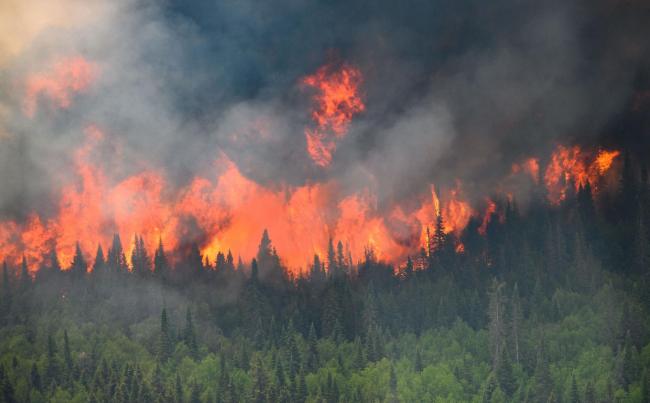Articles Menu

Aug. 27, 2023
As Canada experiences a record-shattering summer of deadly extreme weather, it’s worth remembering that our national pension fund has poured much of our retirement savings into the primary cause of the climate crisis: fossil fuels.
In doing so, the Canada Pension Plan Investment Board is also undermining its own purpose: to provide Canadians with retirement security by achieving a maximum rate of return without undue risk of loss. Fossil fuel industries, after all, must be rapidly phased out to ensure a safe climate future.
This summer’s unprecedented heat waves, wildfires and floods have taken an immense toll on communities, workers, wildlife and ecosystems, underscoring the immediacy of the climate emergency for many Canadians.
Scientists are clear that climate change, primarily driven by the production and combustion of fossil fuels, is making this extreme weather more likely and more intense. The economic impacts of climate disruption are already significant, and will only get worse.
That’s why it’s so problematic for CPPIB to continue investing Canada’s retirement fund in the high-risk fossil fuels driving the climate crisis.
CPPIB is the investment manager for the $575-billion Canada Pension Plan, with 21 million Canadians as members. CPPIB has taken some laudable steps to assess and manage climate-related financial risks, committing to net-zero emissions across all scopes by 2050, developing a “decarbonization investment approach,” setting climate-related expectations for portfolio companies, and making significant investments in climate solutions such as renewable energy and electrification.
Yet some of CPPIB’s investment decisions and portfolio companies are doubling down on fossil fuels, which accelerates the climate crisis and creates undue risk for our retirement portfolio. CPPIB has repeatedly refused to disclose an inventory of its holdings in oil, gas, coal and related infrastructure. But in July, 2022, CPPIB said it held a staggering $21.72 billion in fossil fuel producers alone.
CPPIB owns 43.5 per cent of Ireland’s largest offshore gas field, 98 per cent of one of the largest U.S. private oil and gas producers, and 49.9 per cent of Peru’s largest exporter of gas, whose pipelines transport gas extracted in the Amazon rain forest.
Here in Canada, through its 99-per-cent stake in Wolf Midstream, CPPIB owns the Access Pipeline System, which gathers and delivers diluent to flow bitumen through pipelines. These companies are included in CPPIB’s deceptively-named “Sustainable Energies” portfolio.
Despite the dire climate warnings of scientists and the millions of Canadians choking on wildfire smoke, CPPIB continues to bet our national retirement fund on investments that require expanding and prolonging oil and gas production to generate returns.
In February, Calpine Corp., the largest gas-fired U.S. electricity generator, 13.4 per cent owned by CPPIB, announced it will build a new gas plant in Texas. In March, CPPIB spent a reported US$400-million to buy a 49-per-cent stake in Aera Energy LLC, California’s second-largest oil and gas producer. In June, Denver-based Civitas Resources Inc., in which CPPIB is the largest shareholder, announced it would spend US$4.7-billion to increase its oil and gas production by 60 per cent.
Last year, CPPIB committed US$100-million to Kimmeridge Fund VI, a private equity fund that will be used to produce more fracked gas and build a new Gulf Coast liquefied natural gas terminal.
CPPIB claims that it must stay invested in fossil fuels so that it can “share [its] expectations and use [its] governance rights” to influence companies that are failing to manage climate risks.
Yet CPPIB voted against climate-related shareholder resolutions at Imperial Oil Ltd., Enbridge Inc. and Royal Bank of Canada this spring, while voting for the re-election of almost all directors at Pathways Alliance oil sands companies. Pathways lobbies aggressively to undermine government climate policy and faces a formal greenwashing investigation, while its members admit publicly that they’re deprioritizing the energy transition.
CPPIB claims that it’s “difficult to overstate the urgency of reducing GHG emissions.” But CPPIB’s continued investment in fossil fuels is irreconcilable with its net-zero emissions commitment and its purpose of providing Canadians with retirement security across an investment horizon that spans decades.
There is scientific consensus that oil and gas production must be rapidly phased out to avert catastrophic climate outcomes. There must be someone at CPPIB, which spent more than $1-billion on personnel last year, with the skills to translate this decarbonization imperative into a credible climate plan for the CPP.
Like millions of Canadians, I have no choice but to contribute to the CPP with every paycheque. I’d like to collect those compounded savings when I retire in a few decades.
But that money might not be there if CPPIB keeps risking it on fossil fuels. It’s astounding that CPPIB won’t acknowledge that there is no retirement security without a safe climate to retire into.
Patrick DeRochie is the senior manager of Shift Action for Pension Wealth and Planet Health, a charitable project that tracks the fossil fuel investments and climate policies of Canadian pension funds, and mobilizes pension beneficiaries to engage fund managers on the climate crisis.
[Top photo: Flames reach upwards along the edge of a wildfire as seen from a Canadian Forces helicopter surveying the area near Mistissini, Quebec, Canada June 12, 2023.CANADIAN FORCES VIA REUTERS]